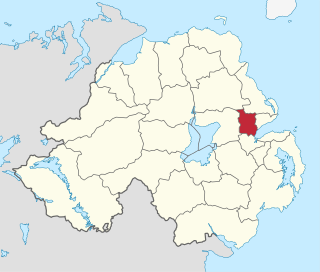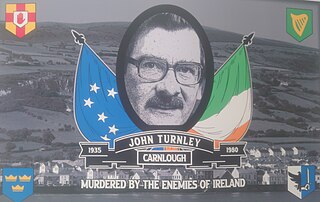Related Research Articles

The Ulster Unionist Party (UUP) is a unionist political party in Northern Ireland. The party was founded as the Ulster Unionist Council in 1905, emerging from the Irish Unionist Alliance in Ulster. Under Edward Carson, it led unionist opposition to the Irish Home Rule movement. Following the partition of Ireland, it was the governing party of Northern Ireland between 1921 and 1972. It was supported by most unionist voters throughout the conflict known as the Troubles, during which time it was often referred to as the Official Unionist Party (OUP).
The Progressive Unionist Party (PUP) is a minor unionist political party in Northern Ireland. It was formed from the Independent Unionist Group operating in the Shankill area of Belfast, becoming the PUP in 1979. Linked to the Ulster Volunteer Force (UVF) and Red Hand Commando (RHC), for a time it described itself as "the only left of centre unionist party" in Northern Ireland, with its main support base in the loyalist working class communities of Belfast.
John Robert Beggs, commonly known as Roy Beggs, is a Northern Irish unionist politician and former teacher. Formerly a member of the Democratic Unionist Party (DUP), he defected to the rival Ulster Unionist Party (UUP) in 1981. He served as Member of Parliament (MP) for East Antrim from 1983 to 2005, and was a Larne Borough Councillor from 1973 to 2014, representing the district of Larne Area B and its successor, Larne Lough.
William Martin Smyth is a Northern Irish unionist clergyman-politician. An ordained minister of the Presbyterian Church in Ireland, he was Grand Master of the Orange Order during much of the Troubles and served as the Ulster Unionist Party (UUP) Member of Parliament (MP) for Belfast South from 1982 to 2005. He was also a vice-president of the Conservative Monday Club.

Newtownabbey Borough Council was a Local Authority in County Antrim in Northern Ireland, on the north shore of Belfast Lough just immediately north of Belfast. The Council merged with Antrim Borough Council in April 2015 under local government reform in Northern Ireland to form Antrim and Newtownabbey Borough Council.
The Ulster Popular Unionist Party (UPUP) was a unionist political party in Northern Ireland. It was founded in 1980 by James Kilfedder, independent Unionist Member of Parliament for North Down, who led the party until his death in 1995. For a brief period in 1980, it was known as the Ulster Progressive Unionist Party before it adopted the "Popular" name.

The Vanguard Unionist Progressive Party (VUPP), informally known as Ulster Vanguard, was a unionist political party which existed in Northern Ireland between 1972 and 1978. Led by William Craig, the party emerged from a split in the Ulster Unionist Party (UUP) and was closely affiliated with several loyalist paramilitary groups. The party was set up in opposition to compulsory power sharing with Irish nationalist parties. It opposed the Sunningdale Agreement and was involved in extra-parliamentary activity against the agreement. However, in 1975, during discussions on the constitutional status of Northern Ireland in the constitutional convention, William Craig suggested the possibility of voluntary power sharing with the nationalist Social Democratic and Labour Party. In consequence the party split, with dissenters forming the United Ulster Unionist Party. Thereafter Vanguard declined and following poor results in the 1977 local government elections, Craig merged the remainder of Vanguard into the UUP in February 1978.

The United Ulster Unionist Party (UUUP) was a unionist political party which existed in Northern Ireland between 1975 and 1984.

East Antrim is a parliamentary constituency in the United Kingdom House of Commons. It is currently represented by Sammy Wilson of the Democratic Unionist Party.

South Antrim is a parliamentary constituency in the United Kingdom House of Commons. The current MP is Robin Swann (UUP)
Kennedy Lindsay (1924–1997) was a Northern Ireland politician and a leading advocate of Ulster nationalism. Born in Canada but raised in Northern Ireland, Lindsay pursued a career as a history academic before becoming associated with the Ulster Vanguard tendency of unionism. He took a leading role in the tendency within the Vanguard that supported a diminished role for the United Kingdom in Northern Ireland and produced the Dominion of Ulster, outlining his views, in 1972.

William Paul Girvan is a retired Democratic Unionist Party (DUP) politician who was the Member of Parliament (MP) for South Antrim from 2017 to 2024. In this role, Girvan was the DUP's spokesperson for Transport. He was previously a Member of the Northern Ireland Assembly (MLA) for South Antrim from 2003 to 2007, and then from 2010 to 2017.
William Alexander Fraser Agnew, known as Fraser Agnew, is a retired Northern Irish unionist politician who was an Antrim and Newtownabbey Councillor for the Three Mile Water DEA from 2014 to 2023. He was previously an Independent Unionist Member of the Legislative Assembly (MLA) for Belfast North from 1998 to 2003.
The Northern Ireland Conservatives is a section of the United Kingdom's Conservative Party that operates in Northern Ireland. The Conservatives are the only major British party to field candidates within Northern Ireland and typically contests only a fraction of seats in elections. The party won 0.03% of the vote in the 2022 Northern Ireland Assembly election and 0.1% of the vote in the 2024 United Kingdom General election in Northern Ireland.

John Turnley was an assassinated Irish nationalist councillor and activist. Originally from a unionist background, he was gradually drawn to Irish nationalism and became a republican activist. He was killed in 1980 by loyalists in Carnlough, County Antrim.
Robert Lindsay Mason, known as Lindsay Mason, was a Northern Irish unionist politician and businessman. Known as something of an eccentric, Mason's entire career in politics was spent outside the major unionist parties such as the Ulster Unionist Party and the Democratic Unionist Party.
May Steele was a Northern Irish Ulster Unionist Party (UUP) politician who was Party President from 2016 to 2020, and a Member of the Northern Ireland Forum for East Antrim from 1996 to 1998.
Thomas Daniel Robinson, known as Tom Robinson, is a former Northern Irish unionist politician who was a Larne Borough Councillor for the Larne Area A DEA from 1977 to 1985, and then for the Coast Road DEA from 1985 to 2001, representing the Ulster Unionist Party (UUP) on both occasions.
The Ulster Unionist Party held the majority of Northern Ireland seats in most elections for the Westminster Parliament between 1922 and 2001. Since then its representation has been low or non-existent, having been eclipsed by the Democratic Unionist Party. It always had an absolute majority in the Stormont Parliament (1921–1972); since that Parliament was replaced by the Northern Ireland Assembly it has had a substantial minority representation there. Its share of the vote in Northern Ireland local government elections has tended to diminish, so that there too it is no longer the largest party. Finally, the party has always held one of the three Northern Ireland seats in the European Parliament. Its share of the Northern Ireland vote in the most recent elections to these bodies has been between 10.5% and 16.1%.
References
- 1 2 "British Ulster Dominion Party (BUDP)". Conflict Archive on the Internet . Archived from the original on 19 May 2024. Retrieved 19 December 2024.
- ↑ Damkat, Ivo (29 October 2003). "The Local Government Elections 1973-1981: Antrim". ARK . Retrieved 19 December 2024.
- ↑ Damkat, Ivo (14 October 2003). "The Local Government Elections 1973-1981: Larne". ARK . Retrieved 19 December 2024.
- ↑ Damkat, Ivo; Whyte, Nicholas (23 August 2004). "The Local Government Elections 1973-1981: Newtownabbey". ARK . Retrieved 19 December 2024.
- ↑ "Professor Kennedy Lindsay". ulsternation.org.uk. Third Way Publications. Archived from the original on 25 January 2008. Retrieved 19 December 2024.
- ↑ Whyte, Nicholas (25 March 2003). "South Antrim 1973-1982". ARK . Retrieved 19 December 2024.
- ↑ Lindsay, Kennedy (1972). Dominion of Ulster (PDF). Belfast, Northern Ireland: Ulster Vanguard – via CAIN.
- ↑ "Holdings: Dominion of Ulster?". National Library of Ireland . Retrieved 19 December 2024.
